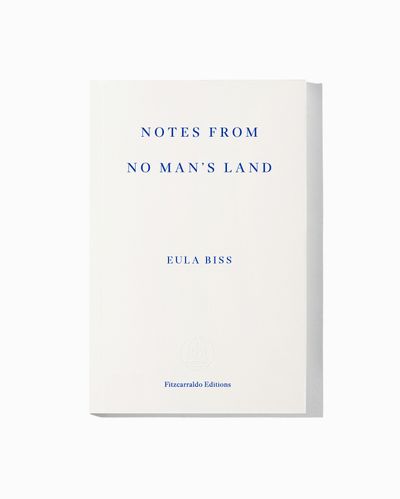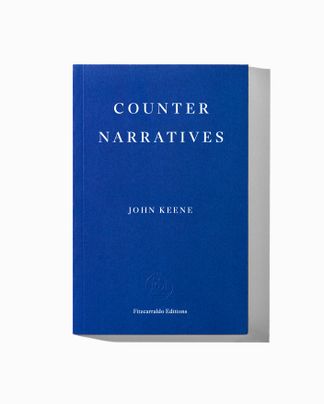A frank and fascinating exploration of race and racial identity, Notes from No Man’s Land: American Essays begins with a series of lynchings and ends with a series of apologies. Eula Biss explores race in America and her response to the topic is informed by the experiences chronicled in these essays – teaching in a Harlem school on the morning of 9/11, reporting from an African American newspaper in San Diego, watching the aftermath of hurricane Katrina from a college town in Iowa, and settling in Chicago’s most diverse neighbourhood.
As Biss moves across the country from New York to California to the Midwest, her essays move across from biblical Babylon to the freedmen’s schools of Reconstruction to post-war white flight. She brings an eclectic education to the page, drawing variously on the Eagles, Laura Ingalls Wilder, James Baldwin, Joan Didion, religious pamphlets, and reality television. These spare, sometimes lyric essays explore the legacy of race in America, artfully revealing in intimate detail how families, schools, and neighbourhood participate in preserving racial privilege.

Notes from No Man’s Land
With a new afterword
Published 19 April 2017, French paperback with flaps, 240 pages
Notes from No Man’s Land
With a new afterword
TIME AND DISTANCE OVERCOME
“Of what use is such an invention?” the New York World asked shortly after Alexander Graham Bell first demonstrated his telephone in 1876. The world was not waiting for the telephone.
Bell’s financial backers asked him not to work on his new invention because it seemed too dubious an investment. The idea on which the telephone depended—the idea that every home in the country could be connected by a vast network of wires suspended from poles set an average of one hundred feet apart— seemed far more unlikely than the idea that the human voice could be transmitted through a wire.
Even now it is an impossible idea, that we are all connected, all of us.
“At the present time we have a perfect network of gas pipes and water pipes throughout our large cities,” Bell wrote to his business partners in defense of his idea. “We have main pipes laid under the streets communicating by side pipes with the various dwellings…. In a similar manner it is conceivable that cables of telephone wires could be laid underground, or suspended overhead, communicating by branch wires with private dwellings, counting houses, shops, manufactories, etc., uniting them through the main cable.”
Imagine the mind that could imagine this. That could see us joined by one branching cable. This was the mind of a man who wanted to invent, more than the telephone, a machine that would allow the deaf to hear.
For a short time the telephone was little more than a novelty. For twenty-five cents you could see it demonstrated by Bell himself, in a church, along with singing and recitations by local talent. From some distance away, Bell would receive a call from “the invisible Mr. Watson.” Then the telephone became a plaything of the rich. A Boston banker paid for a private line between his office and his home so that he could let his family know exactly when he would be home for dinner.
Mark Twain was among the first Americans to own a telephone, but he wasn’t completely taken with the device. “The human voice carries entirely too far as it is,” he remarked.
By 1889, the New York Times was reporting a “War on Telephone Poles.” Wherever telephone companies were erecting poles, home owners and business owners were sawing them down or defending their sidewalks with rifles.
Property owners in Red Bank, New Jersey, threatened to tar and feather the workers putting up telephone poles. A judge granted a group of home owners an injunction to prevent the telephone company from erecting any new poles. Another judge found that a man who had cut down a pole because it was “obnoxious” was not guilty of malicious mischief.
Telephone poles, newspaper editorials complained, were an urban blight. The poles carried a wire for each telephone— sometimes hundreds of wires. And in some places there were also telegraph wires, power lines, and trolley cables. The sky was netted with wires.
The war on telephone poles was fueled, in part, by that terribly American concern for private property, and a reluctance to surrender it for a shared utility. And then there was a fierce sense of aesthetics, an obsession with purity, a dislike for the way the poles and wires marred a landscape that those other new inventions, skyscrapers and barbed wire, were just beginning to complicate. And then perhaps there was also a fear that distance, as it had always been known and measured, was collapsing.
The city council in Sioux Falls, South Dakota, ordered policemen to cut down all the telephone poles in town. And the mayor of Oshkosh, Wisconsin, ordered the police chief and the fire department to chop down the telephone poles there. Only one pole was chopped down before the telephone men climbed all the poles along the line, preventing any more chopping. Soon, Bell Telephone Company began stationing a man at the top of each pole as soon as it had been set, until enough poles had been set to string a wire between them, at which point it became a misdemeanor to interfere with the poles. Even so, a constable cut down two poles holding forty or fifty wires. And a home owner sawed down a recently wired pole, then fled from police. The owner of a cannery ordered his workers to throw dirt back into the hole the telephone company was digging in front of his building. His men threw the dirt back in as fast as the telephone workers could dig it out. Then he sent out a team with a load of stones to dump into the hole. Eventually, the pole was erected on the other side of the street.
Despite the war on telephone poles, it would take only four years after Bell’s first public demonstration of the telephone for every town of more than ten thousand people to be wired, although many towns were wired only to themselves. By the turn of the century, there were more telephones than bathtubs in America.
“Time and dist. overcome,” read an early advertisement for the telephone. Rutherford B. Hayes pronounced the installation of a telephone in the White House “one of the greatest events since creation.” The telephone, Thomas Edison declared, “annihilated time and space, and brought the human family in closer touch.”
*
In 1898, in Lake Cormorant, Mississippi, a black man was hanged from a telephone pole. And in Weir City, Kansas. And in Brookhaven, Mississippi. And in Tulsa, Oklahoma, where the hanged man was riddled with bullets. In Danville, Illinois, a black man’s throat was slit, and his dead body was strung up on a telephone pole. Two black men were hanged from a telephone pole in Lewisburg, West Virginia. And two in Hempstead, Texas, where one man was dragged out of the courtroom by a mob, and another was dragged out of jail.
A black man was hanged from a telephone pole in Belleville, Illinois, where a fire was set at the base of the pole and the man was cut down half-alive, covered in coal oil, and burned. While his body was burning the mob beat it with clubs and cut it to pieces.
Lynching, the first scholar of the subject determined, is an American invention. Lynching from bridges, from arches, from trees standing alone in fields, from trees in front of the county courthouse, from trees used as public billboards, from trees barely able to support the weight of a man, from telephone poles, from streetlamps, and from poles erected solely for that purpose. From the middle of the nineteenth century to the middle of the twentieth century, black men were lynched for crimes real and imagined, for whistles, for rumors, for “disputing with a white man,” for “unpopularity,” for “asking a white woman in marriage,” for “peeping in a window.”
(…)
‘Eula Biss’s elegantly structured essays in Notes from No Man’s Land are delivered with a deceptively quiet insistence that nevertheless leaves the reader shaken.… in a detached, poetic narrative voice that is as mesmerising as it is sure-footed, Biss deftly turns to a consideration of what happened next.… So it is with the rest of this wondrous book.… She begins in one place and confidently leads somewhere unexpected. She picks and worries at the idea of race in America – incarceration, education, social welfare.… Lyrical she may be, but she is also exhilaratingly bold. Notes From No Man’s Land offers an uncompromising interrogation of a troubled land by a writer who refuses what could be her birthright as a white woman … Biss is rare in that she does not treat her own race as the default (the norm from which ‘people of colour’ are somehow deviating). The fact that this in itself is remarkable proves the value of her endeavour.’
— Ellah Allfrey, The Spectator
‘I can’t think of an American writer at work today who matches Eula Biss’s combination of lyrical precision, exhaustive research, timely provocation, and fiercely examined conscience.’
— Maggie Nelson, author of The Argonauts
‘Two of the qualities that make Eula Biss’s essays in Notes from No Man’s Land compelling and beautiful are precision and independence – independence from orthodoxies of the right and left and the conventions of literary essays and their displays of sensibility and sensitivity. And whatever topic she takes up she dissects and analyzes with startling insight that comes from deep reading and original thinking. She’s important to this moment, important to the opening up of what essays can be, important for setting a standard of integrity and insight, and she’s also a joy to read.’
— Rebecca Solnit, author of Hope in the Dark
‘The essays in this book were written prior to Trump’s election, and have acquired extra resonance in light of it. At a time of profound uncertainty about what it means to be American, Biss’s insights on the history of American migration, both internal (rural-urban, and vice versa) and external, are especially timely … Like so much of Biss’s writing, the message here is simultaneously both forceful and measured – no mean feat when there is so much at stake.’
— Houman Barekat, Irish Times
‘[Notes from No Man’s Land] is an archival project, a wide-ranging, elegantly shaped collage…. Biss is … consistently enlightening.’
— Jamie Fisher, the TLS
‘Biss notes formidably well – unsparingly and sometimes lyrically … justifiably compared to Joan Didion.’
— Kevin Gopal, Big Issue North
‘Notes From No Man’s Land is the most accomplished book of essays anyone has written or published so far in the twenty-first century. Notes From No Man’s Land is the kind of book that rewards and even demands multiple readings. It provokes, troubles, charms, challenges, and occasionally hectors the reader, and it raises more questions than it answers. It is strident and brave in its unwillingness to offer comfort, and, unlike all but a handful of the best books I have ever read, it is unimpeachably great.’
— Kyle Minor, Salon
‘Notes From No Man’s Land is a beautiful exercise in consciousness; in bringing both intelligence and experience to bear on a subject that has implications for the way one behaves in the world.’
— Susan Salter Reynolds, Los Angeles Times
Praise for On Immunity
‘Sontag said she wrote Illness as Metaphor to “calm the imagination, not to incite it,” and On Immunity also seeks to cool and console. But where Sontag was imperious, Biss is stealthy. She advances from all sides, like a chess player, drawing on science, myth, literature to herd us to the only logical end, to vaccinate.’
— Parul Sehgal, The New York Times
‘On Immunity is brave because it will attract hostility from those she implies are selfish or misguided in refusing to vaccinate. Her arguments are profoundly compelling, and her narratives are braided together with beauty and elegance. The book is itself an inoculation – it grafts and unites different traditions of the essay, and in doing so creates something stronger and more resilient. And its urgent message is an inoculation against ignorance and fearmongering: may it spread out through the world, bringing substance and common sense to the vaccination debate.’
— Gavin Francis, Guardian
‘On Immunity … weaves metaphor and myth, science and sociology, philosophy and politics into a tapestry rich with insight and intelligence.’
— Jerome Groopman, The New York Review of Books
‘A philosophical look at the history and practice of vaccination that reads like Joan Didion at her best. If you are yourself a nonfiction author, your initial response to this book might be to decide immediately on another line of work; Biss is that intimidatingly talented … This is cultural commentary at its highest level, a searching examination of the most profound issues of health, identity and the tensions between individual parenting decisions and society.’
— The Washington Post
Eula Biss is the author of The Balloonists, Notes from No Man’s Land: American Essays, which received the Graywolf Press Nonfiction Prize and the National Book Critics Circle Award in Criticism, and On Immunity. Her essays have appeared in The Best American Nonrequired Reading and The Best Creative Nonfiction, as well as in the Believer and Harper’s. Her writing has been supported by fellowships from the Guggenheim Foundation, the Howard Foundation, and the National Endowment for the Arts. Biss holds a BA from Hampshire College and an MFA in Nonfiction Writing from the University of Iowa. She teaches at Northwestern University and lives in Chicago.




